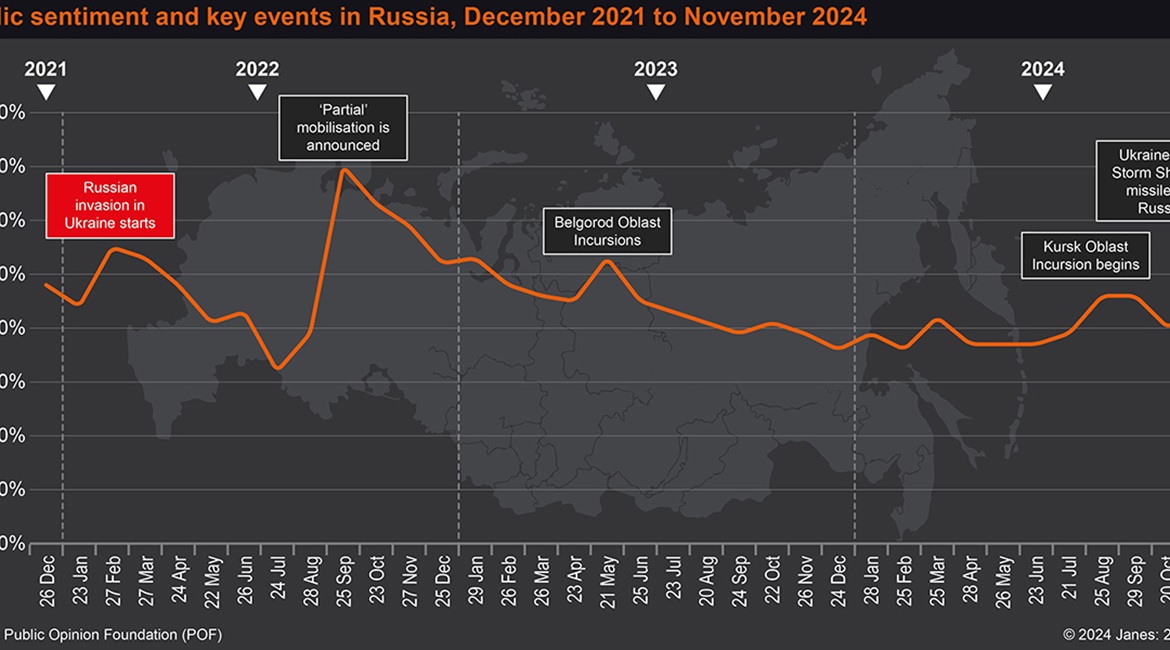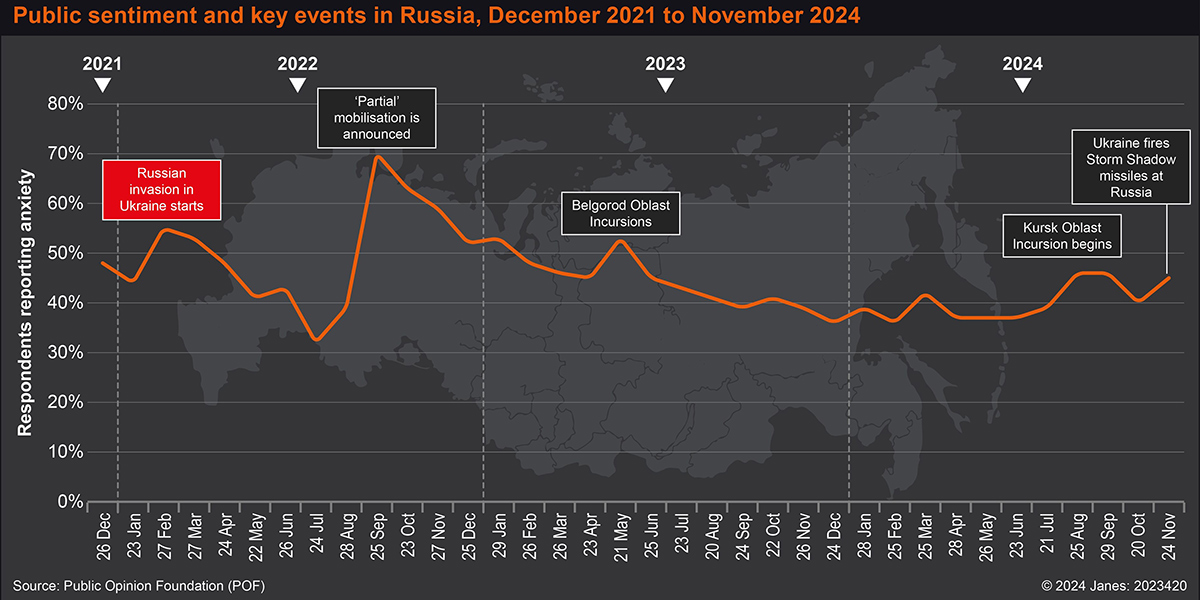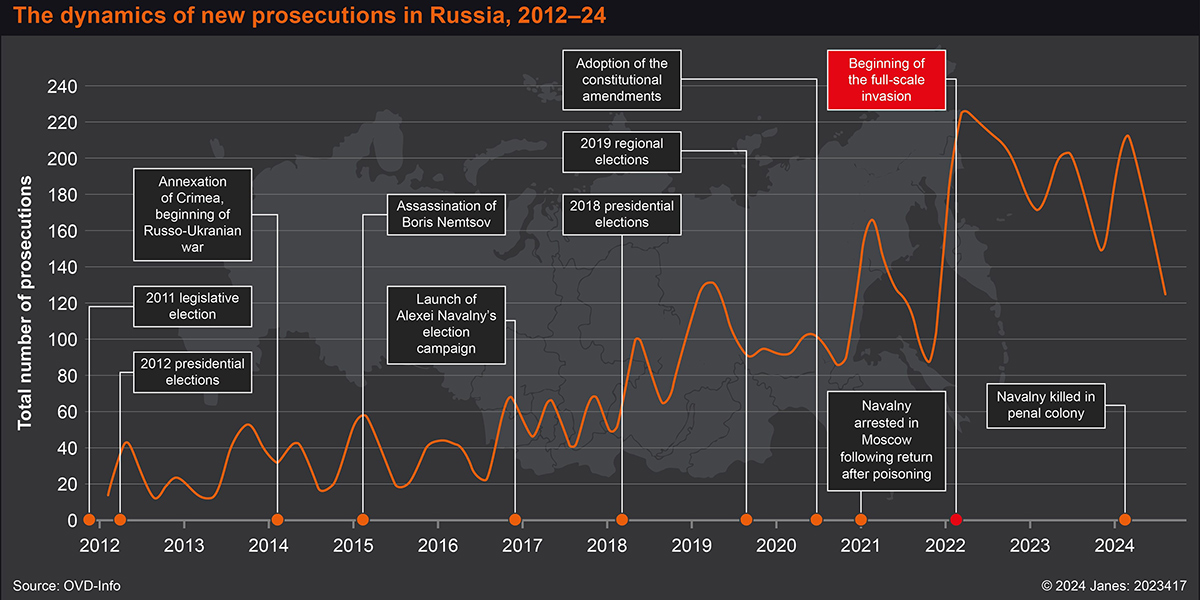
Date Posted: 19-Dec-2024
Author: Carlos Barerra, London, United Kingdom
Key points
- Intelligence requirement/question: This report assesses the intelligence requirement – understanding the impact of the Ukraine conflict on social stability in Russia and how the government promotes the popularity of its ‘special military operation' and uses the legal system to counteract dissenting groups
- Significance: Analysis of Russia-based polling suggests that the majority of Russians express their support for President Vladimir Putin and solidarity with the armed forces; however, the public is also affected by the developments in the Russia-Ukraine conflict zone and would support imminent peace negotiations. Any public dissent relating to the conflict is severely suppressed, with ‘wives and mothers' of mobilised soldiers remaining the only significant visible social group in the anti-war protest movement inside Russia
- Assessment and outlook: The preparation of a new narrative on the ‘victory' testifies the Kremlin's readiness to begin negotiations with Ukraine. The analysis of the polls indicates that Russian society is very likely to be content with the possible negotiations, especially if it leads to a ceasefire and Russia keeping its annexed territories. Meanwhile, the Kremlin will very likely continue to promote a narrative of the prestige of military service and further increase contracted military personnel's pay in an attempt to avoid a new wave of mobilisation
Intelligence requirement/question
This report outlines Janes assessment of changes in public opinion in Russia regarding the ongoing war in Ukraine since the beginning of the full-scale invasion. The report focuses on the main drivers of changes to public sentiment towards the war and assesses how the Kremlin continues to prepare the public for possible peace negotiations.
The report addresses the following questions:
- How is Russian public opinion affected by the developments in the Russia-Ukraine conflict, and what is their perception of possible peace negotiations?
- What impact has the war had on social stability, and which protest groups remain active in Russia? How is the Kremlin counteracting the dissenting groups?
- What strategies is the Kremlin using to attract more manpower for contracted military personnel?
- Did the war in Ukraine become a social lift for the new ‘elite' in Russia?
- What are the main social and internal security concerns for the Kremlin in view of possible peace negotiations?
Significance
Overview of Russian opinion polls
On 22 November 2024 the liberal-leaning research group Russian Field published results of a phone poll conducted between 7 and 12 November, asking if the respondents would support President Vladimir Putin if he were to sign a peace agreement with Ukraine. According to the poll, 79% of 1,600 respondents said they would support a peace agreement, increasing from 67% in May 2022 and 70% in June 2023. The Russian Field data shows that the support for continuation of the war is at its lowest point since May 2022.
Another Russian independent pollster and research organisation Levada Center published a press release in August 2024 stating that the support for the Russian Armed Forces remains high – with 77% of respondents “fully supporting” or “mostly supporting” in contrast to only 17% “mostly” or “definitely not supporting” the actions of armed forces in Ukraine. The remaining 6% said it was “hard to answer”. Since February 2022 Levada Center data shows the lack of significant changes in sentiment towards the actions of Russian Armed Forces in Ukraine. However, the level of support for peace talks has remained relatively stable since September 2022 – remaining around 45–58% – and reaching 58% in June 2024.
The seemingly contradictory nature of the polling reflects the patriotism of Russian society that is tempered by the wide involvement of military non-professional conscripts. Moreover, expressing discontent with the actions of armed forces publicly or even in private conversations can lead to severe legal repercussions, including fines and imprisonment. For example, Russian authorities jailed a 68-year-old paediatrician, Nadezhda Buyanova, in November 2024 for five years over a single remark to her patient about the actions of Russian soldiers in Ukraine.
Janes recognises that the opinion polls conducted in Russia may not fully reflect the public sentiment – the respondents are aware of the potential consequences of expressing opinions not in line with the official narratives and are unlikely to freely express themselves to an interviewer. If Russian respondents wanted to express their lack of support to the war in Ukraine, they were more likely to do so indirectly.
An example of data that very likely reflects actual sentiment regarding current affairs was collected in a poll on “feelings of anxiety” by Public Opinion Foundation (Fond Obshchestvennoye mneniye – Фонд Общественное Мнение: FOM), a Russian state-controlled pollster. Its weekly “anxiety index” poll asked the respondents to gauge whether the people around them are feeling calm or anxious – providing the respondents an opportunity to express their own feelings indirectly by talking about others without fear of being exposed. The FOM data shows clear spikes of “anxiety” around September 2022, when the government announced “partial mobilisation”, and lasted till January 2023, as well as a brief spike in May 2023, during the cross-border incursions by Ukrainian armed groups into Russia's Belgorod Oblast. The last significant spike of “anxiety” was registered during August–September 2024, coinciding with the beginning of Ukrainian military forces' incursion into Kursk. The anxiety levels dropped in early November after presidential elections in the United States and rose again in late November, following Ukraine's attacks on Russian sovereign territory with the long-range missiles.
 The sentiment of the ‘surroundings' in Russia, December 2021 to November 2024. (Public Opinion Foundation)
The sentiment of the ‘surroundings' in Russia, December 2021 to November 2024. (Public Opinion Foundation)
Another Moscow-based communications agency Public Relations Development Company (Companiya razvitiya obshchestvennich svyazey – Компания Развития Общественных Связей: KROS) publishes a quarterly “national anxieties index”, ranking 10 topics that the population is most concerned about. In the third quarter of 2024 the “Kursk incursion” topped the list, followed by the “slowdown of YouTube” and “illegal migration”. In the first and second quarters of 2024 the list also included the “escalation of the conflict with NATO” (ranked sixth and third respectively) and the “diversions and attacks of unmanned aerial vehicles (UAVs)” (ranked first and fourth place in the first and second quarters of 2024 respectively). Similarly, FOM polling data in 2024 showed that 34% out of 1,500 respondents in 104 locations flagged “the risk of attack by another state” as their greatest concern.
Despite not explicitly referring to the Ukraine conflict, both FOM and KROS data corroborates Janes assessment that the Russian population is concerned with the conflict, especially the developments on Russian territory. Janes assesses that “escalation of the conflict with NATO” almost certainly refers to the developments across the conflict zone in Ukraine, as the Kremlin portrays Russia's conflict with Ukraine as a ‘conflict between Russia and NATO'. Moreover, the population's anxiety will almost certainly continue to increase in the short term (one to three months) following the escalation in the Russia-Ukraine conflict zone, notably the authorisation of the use of long-range missiles by the US and UK in November 2024, and Ukraine's attacks on Russian territory in the Kursk and Bryansk regions.
Anti-war protests
Janes Events data recorded an 88% decrease in protest activity in Russia between November 2023 and November 2024 compared to the first 12 months of the war between February 2022 and February 2023. The reduction in frequency and size of protest activity is almost certainly due to the government's repressive responses – the existing legislation criminalises the “discreditation of the armed forces or public authorities”, which means sharing any information related to them not in line with the Kremlin's narrative, “public calls for activities aimed against state security”, as well as unapproved demonstrations.
According to OVD-Info, a Russia-focused independent monitoring group, authorities since February 2022 opened 1,115 criminal cases against the anti-war dissidents as of December 2024. The number of imprisonments and persecutions continues to grow despite the decrease in the number of protests – almost certainly owing to stricter legislation on anti-war statements. OVD-Info data shows an increase of 23.8% in imprisonments on political grounds in 2024 in comparison to 2023. For instance, authorities sentenced a resident of Ekaterinburg, Alexandr Neustroyev, to three years in a penal colony in June 2024 for insulting a child wearing a hat with a letter ‘Z' (symbol of the Russian ‘special military operation') . Similarly, Anastasia Berezhinskaya in November 2024 was jailed for eight years for publishing posts on Russian social media Vkontakte about the events in the Ukrainian towns of Bucha and Kramatorsk (likely regarding the actions of the Russian Army in 2022–23). Janes assesses that due to the restrictive legislation, the decreasing number and scale of the protests do not represent comprehensive evidence of popular sentiment towards the war in Ukraine.

The dynamics of new persecutions in Russia, 2012–24. (OVD-Info)
The only social group that continues to organise protests and openly criticises some aspects of the war in Ukraine is the so-called ‘Wives of Mobilised Soldiers'. The group emerged in response to the mobilisation in September 2022 and mostly comprises female relatives of soldiers. The families of the mobilised mostly organise their activities on the Telegram social media platform – the largest channel is ‘Journey Home' (Put Domoy – Путь Домой) with approximately 50,000 subscribers. Other, primarily female-driven movements/social media channels include Feminist Anti-War Resistance (Feministskoye antivoyennoye soprotivleniye – Феминистское антивоенное сопротивление: FAS), Union of the Committees of Soldiers' Mothers of Russia (Soyuz Komitetov Soldatskikh Materey Rossii – Союз Комитетов Солдатских Матерей России), and Council of Wives and Mothers (Sovet Materey y Zhen – Совет матерей и жен).
Since the beginning of the war, the protests and pickets, organised mostly by female relatives of the soldiers, took place across the country, in Moscow and Saint Petersburg, but also in regional centres, including Yakutsk (capital of Yakutia), Makhachkala (capital of Dagestan), and Penza (capital of Penza Oblast). A protest dedicated to the second anniversary of mobilisation took place on 21 September 2024 in front of the Russian Ministry of Defence. Following the protest, authorities detained 10 women (likely all or almost all protesters), four of whom were fined up to RUB15,000 (USD145) for violating regulations on demonstrations.
These protesters' grievances largely relate to the lack of rotation, lack of necessary preparation and training, as well as the deployment of the conscripts to the front line. However, as Janes observed, these grievances have gradually become more politicised as they went unanswered and have included open criticism of the war and of Putin personally. As a result, the Journey Home movement was proclaimed as a “foreign agent” in May 2024.
Janes assesses that the Kremlin is treating the discontent of the relatives of mobilised soldiers with more restraint compared to other types of protest, very likely due to concerns that military families might become a driving force for significant protest activity in Russia. When these protests began, Putin met with them personally in November 2022 to discuss their concerns. According to the activists of the Council of Wives and Mothers (created in September 2022), only “selected” women were invited. Despite their continued protests, there is still no evidence of any mass criminal cases or imprisonments against the families of the mobilised in contrast to other protest groups. The activities of “mothers and wives” are likely to continue and are very likely to increase if a new wave of mobilisation is announced. However, Janes assesses it is very unlikely that any new protest activity could create disruptions large enough to threaten political stability in the medium term (six to 12 months).






